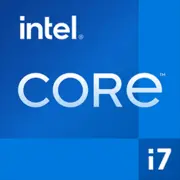Intel Core i7-6950X

Intel Core i7-6950X Broadwell-E: A Journey into Legend for Professionals (2025)
Introduction
In 2016, Intel released the Core i7-6950X processor — the flagship of the Broadwell-E line, aimed at enthusiasts and professionals. Even nearly a decade later, this model remains relevant in niche scenarios. In this article, we will explore who should pay attention to this CPU in 2025, as well as evaluate its strengths and weaknesses in the context of modern tasks.
1. Key Specifications: Architecture and Performance
Codename and Manufacturing Process: Broadwell-E, 14 nm.
Despite the outdated process technology by 2025 standards (modern CPUs use 5-7 nm), the 14-nm architecture provided a high overclocking headroom.
Cores and Threads: 10 cores / 20 threads.
Multithreaded performance is the main advantage of the i7-6950X. Even today, it handles rendering, video encoding, and virtualization well.
Frequencies:
- Base: 3.0 GHz.
- Turbo Boost: up to 3.5 GHz (all cores), up to 4.0 GHz (1-2 cores when manually overclocked).
Cache and TDP:
- L3 — 25 MB (2.5 MB per core).
- TDP — 140 W (reaches 200 W when overclocked).
Key Features:
- Support for 40 PCIe 3.0 lanes – relevant for builds with multiple GPUs or NVMe drives.
- Unlocked multiplier – potential for overclocking.
- Quad-channel memory controller.
Geekbench 6 (2025):
- Single-core: 1020.
- Multicore: 6726.
For comparison: the modern Ryzen 7 7800X3D scores around ~2200/14500, but costs 2-3 times more.
2. Compatible Motherboards: Socket and Chipsets
Socket: LGA 2011-3.
The platform is outdated, and new motherboards are no longer produced. In 2025, they can only be found in the secondary market or from remaining stock.
Chipsets: X99.
Examples of models:
- ASUS Rampage V Extreme (2016 price: $500, current remaining stock — from $250).
- MSI X99A SLI PLUS (original price: $280, current — from $150).
Selection Considerations:
- Check BIOS updates: some boards require a firmware update to support Broadwell-E.
- Number of PCIe slots: to fully utilize the 40 lanes, a board with 3-4 x16 slots is needed.
- VRM cooling: Overclocking requires quality power supply — look for models with heatsinks on MOSFETs.
3. Supported Memory: DDR4 and Its Potential
Memory Type: DDR4 (does not support DDR5).
- Frequencies: 2400-3200 MHz (officially up to 2400 MHz, but overclocking is possible).
- Configuration: 4 channels (4×32 GB maximum = 128 GB).
Recommendations:
- Optimal option: 4×16 GB DDR4-3000.
- Real example: G.Skill Ripjaws V 64 GB kit (4×16 GB) DDR4-3200 costs around $180 (2025).
Important: The quad-channel mode enhances performance in bandwidth-sensitive tasks (e.g., 3D rendering).
4. Power Supply: Power Calculation
Basic Requirements:
- TDP 140 W, but during overclocking, consumption can reach 200-220 W.
- Recommended PSU: from 650 W (considering the graphics card).
Examples:
- For RTX 4070 (200 W) + i7-6950X: Corsair RM750x (750 W, 80+ Gold, $120).
- Economical option: EVGA 650 BQ (650 W, 80+ Bronze, $80).
Tip: Don’t skimp on the PSU — system stability is critical when overclocking.
5. Pros and Cons
Pros:
- Multithreaded power: 10 cores are relevant for rendering, streaming, and working with virtual machines.
- Overclocking potential: With good cooling, it can achieve 4.0-4.2 GHz.
- PCIe flexibility: 40 lanes allow for connecting 2 GPUs + NVMe RAID.
Cons:
- Outdated process technology: High power consumption and heat generation.
- No support for DDR5/PCIe 4.0: Lags behind modern CPUs in speed for storage and memory.
- Price: Remaining new units sell for $800-1000 — unreasonably expensive for 2025.
6. Use Cases
Work Tasks:
- 3D Rendering (Blender, V-Ray): 10 cores perform at a level similar to Ryzen 7 5800X but slower than newer i9-14900K.
- Video Editing (Premiere Pro): Exporting 4K video takes 20-30% longer than with Ryzen 9 7900X.
Gaming:
- 1080p/1440p: In AAA titles (Cyberpunk 2077, Starfield), it is limited by the GPU, but minimum FPS can drop due to weak single-thread performance.
- Streaming: Nvidia's NVENC (encoding via GPU) is preferable to CPU load.
Multimedia:
- Suitable for a home NAS or media server with hardware encoding support.
7. Comparison with Competitors
Intel Core i9-10900K (2020):
- 10 cores / 20 threads, but higher frequencies (5.3 GHz Turbo) and PCIe 3.0 support.
- Price: $400-500 (used). Conclusion: i9-10900K wins in gaming and energy efficiency.
AMD Ryzen 9 5900X (2020):
- 12 cores / 24 threads, PCIe 4.0.
- Geekbench 6 Multi: ~12500. Price: $450 (new).
Conclusion: By 2025, the i7-6950X lags behind even budget newcomers like the Ryzen 7 7700 ($300).
8. Assembly Tips
1. Cooling:
- Minimum: Noctua NH-D15 ($110).
- Optimal: NZXT Kraken X63 (280mm, $150).
2. Motherboard: Avoid cheap X99s from Aliexpress — high risk of defects.
3. Memory: Activate the XMP profile in BIOS for automatic overclocking.
4. SSD: Use NVMe (e.g., Samsung 980 Pro 1 TB, $120) via PCIe adapter.
9. Final Conclusion: Who Should Consider the i7-6950X in 2025?
This processor may be worth considering for:
- Professionals on a budget: If you need 10 cores for rendering but don’t have the funds for a new Ryzen 9.
- Enthusiast retro builders: For experimenting with overclocking on older hardware.
Not Recommended:
- Gamers: Low IPC (instructions per clock) and frequencies.
- Anyone wanting to "future-proof": Lack of DDR5 and PCIe 5.0 support limits upgrades.
Alternative: For $800-1000, it’s better to buy a new Ryzen 7 7800X3D or Intel Core i5-14600K — they are more efficient in all scenarios.
Conclusion
The Intel Core i7-6950X remains an intriguing artifact from an era when Intel dominated the HEDT segment. Today, it should only be seen as a temporary solution or a niche tool. But even after years, it serves as a reminder that true power lies not just in gigahertz, but in smart optimization.
Basic
CPU Specifications
Memory Specifications
GPU Specifications
Miscellaneous
Benchmarks
Compared to Other CPU
Share in social media
Or Link To Us
<a href="https://cputronic.com/cpu/intel-core-i7-6950x" target="_blank">Intel Core i7-6950X</a>